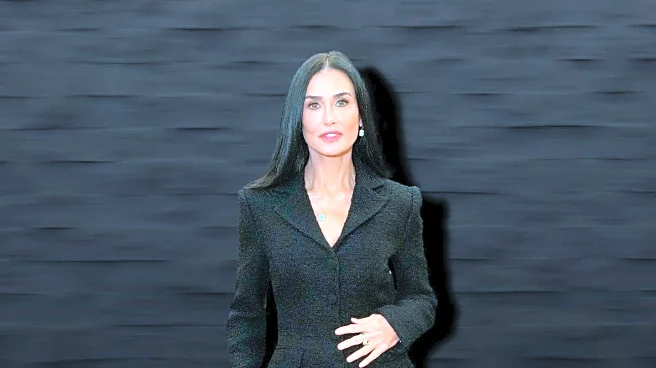What's Happening?
Emma Heming Willis, wife of actor Bruce Willis, has publicly responded to the reactions following her interviews about her husband's battle with frontotemporal dementia. In a recent interview with ABC News' Diane Sawyer, Heming Willis discussed the challenges of caregiving and the decision to move Bruce to a separate home with 24-hour care. She expressed appreciation for the awareness raised about frontotemporal dementia and caregiving, while acknowledging the mixed public opinions. Heming Willis highlighted the judgment caregivers often face, emphasizing the importance of understanding their experiences. Bruce Willis, diagnosed with aphasia in 2022, later identified as frontotemporal dementia, retired from acting due to his condition.
Why It's Important?
The public discussion initiated by Emma Heming Willis is significant in raising awareness about frontotemporal dementia, a condition affecting approximately 60,000 people in the U.S. It underscores the challenges faced by caregivers, who often encounter judgment and criticism. Heming Willis' advocacy for better understanding of dementia and caregiving is crucial in fostering empathy and support for affected families. Her forthcoming book aims to provide guidance and strength to caregivers, highlighting the emotional and practical aspects of their journey. This dialogue may influence public policy and societal attitudes towards dementia care, potentially leading to improved resources and support systems.
What's Next?
Emma Heming Willis is set to release her book, 'The Unexpected Journey: Finding Strength, Hope, and Yourself on The Caregiving Path,' on September 9. The book aims to offer insights and support to caregivers navigating similar challenges. As awareness grows, there may be increased advocacy for dementia research and caregiver support initiatives. Heming Willis' continued public engagement could inspire further conversations about the realities of caregiving and the need for comprehensive care solutions. Stakeholders in healthcare and policy may respond by prioritizing dementia care and support services.
Beyond the Headlines
The discussions sparked by Emma Heming Willis' interviews highlight the ethical and emotional dimensions of caregiving. Her emphasis on personal experience over public opinion challenges societal norms about caregiving roles and responsibilities. This narrative may encourage a cultural shift towards valuing and supporting caregivers, recognizing their critical role in managing complex health conditions. The family's decision to maintain privacy while advocating for awareness reflects broader issues of dignity and respect in health communication.









